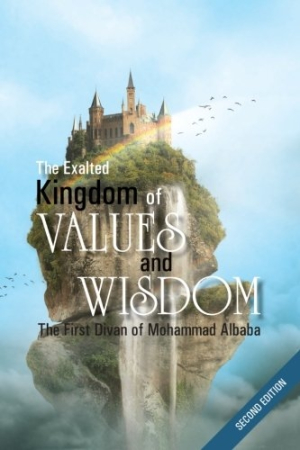
The Exalted Kingdom of Values and Wisdom
Second Edition
Faith, poetry, and life in the Middle East are combined into one bridge-building volume.
The Exalted Kingdom of Values and Wisdom showcases the union of Mohammad Albaba’s technical nature as a computer scientist with his passion for poetry. The poet provides straightforward explanations of his life and faith alongside twenty rhymed poems that are categorized into four themes: love, family, storytelling, and personal experiences.
Though presented as a divan—a name for a collection of poems as well as a poetic tradition most often associated with Arabic or Persian literature—Albaba’s book is more than a volume of his verse. Within, readers will find a brief history of the prophet Mohammad, a retelling of the love story of Arabic icons Qays and Lubna, short translations of Arabic works into English, and autobiographical explanations that present the Islamic faith on the micro level. With just over twenty pages of poetry within a volume of ninety-five pages, those seeking Albaba’s poems will have to wend their way through this additional material.
The project on the whole serves to build bridges between cultures. The piece “Canada,” written as a letter, shares some of Albaba’s experiences emigrating from Saudi Arabia to Canada. “The Parting of a Hero,” an elegy for Albaba’s cousin who died in the ongoing conflict in Syria, and “The Evolution of a Dictatorship” bring home the difficult political realities of life in the Middle East. At the same time, however, “The Splendid Pearl,” which honors the poet’s mother, and “The School of Life,” about an unnamed difficult trial Albaba once faced, show clearly how much we all have in common with each other—how we all simply care about the same things no matter where we live or what we believe in.
It is obvious that Albaba is very well educated and passionate about his subject matter. There is, however, an overabundance of clarification that significantly limits the audience of the collection. A glossary that contains definitions of terms like “couplet,” “sonnet,” and “epic poem,” among many others, would be useful primarily to young readers or to brand-new students of poetry.
The twenty poems offered also leave little to the imagination. The setup to the pieces—which includes an introduction to each of the four thematic sections, a preamble to every poem (the longest extending thirteen pages), as well as information about the number of verses, the specific form or structure being used, and when and where a piece was written—offers a great deal of clarity but detracts from any potential emotional punch. Less explanation would allow readers to approach Albaba’s poetry on their own terms.
Monorhymed verses are used frequently here, which is, according to Albaba, an element of traditional Arabic poetry: “In life I seek to talk and walk according to your guidance. / In mercy, love, and tolerance you are the greatest instance.” At times the content lacks depth, in part because the poet does not rely on imagery or metaphor as much as he does on form and rhyme. As such, there is little room for resonance; one can appreciate the work Albaba has done to craft his lines and rhymes, but it will be difficult for many Western readers of contemporary poetry to find something to connect with.
Those interested in Arabic poetry, the tradition of the divan, or in gaining a basic understanding of some of the practices and beliefs of Islam through the eyes and heart of a poet will enjoy this volume.
Reviewed by
Margaret Fedder
Disclosure: This article is not an endorsement, but a review. The publisher of this book provided free copies of the book and paid a small fee to have their book reviewed by a professional reviewer. Foreword Reviews and Clarion Reviews make no guarantee that the publisher will receive a positive review. Foreword Magazine, Inc. is disclosing this in accordance with the Federal Trade Commission’s 16 CFR, Part 255.
